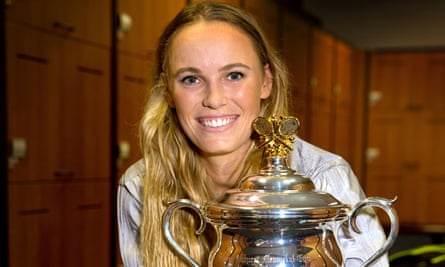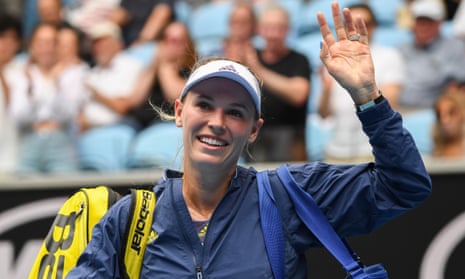Caroline Wozniacki has spent the majority of her life in a fishbowl, her every move monitored and detailed. She never complained, accepting that it is part of the business of being a top sportswoman, that if she told paparazzi not to take photos it wouldn’t do any good. But now she is getting out, and she could not be happier.
“I think I had my first interview when I was eight or nine years old, it’s pretty crazy,” Wozniacki said at the Australian Open. “My whole life I’ve been scrutinised, my career’s been scrutinised. So it’s nice to do what I want to do, not have to think twice about anything. Obviously I want to make right decisions but just be able to live life.
“That’s the great thing about being an athlete, once you stop, there are always new people coming up and taking your spot, you can live a normal life, you can live a family life and have the best of both worlds, having your time in the spotlight but also just doing normal stuff.”
Wozniacki announced last month that this year’s Australian Open, where she won her first and only grand slam title in 2018, would be her last event. The Dane, who topped the world rankings at the age of 20, spent 71 weeks as the world No 1 and has won 30 titles all over the world, from Stockholm in 2008 to Beijing in 2018.
Few players can boast a career even half as good as Wozniacki, who has also won more than $35m in prize money. No one worked harder or was more dedicated and, as she showed yet again at Melbourne Park on Wednesday her desire remains undimmed; she came back from 5-1 down in the first set and 3-0 down in the second to beat one of the young pretenders, the No 23 seed, Dayana Yastremska of Ukraine, in the second round, extending her career a few days longer at least.
At 29, she is retiring relatively young by today’s standards. Her decision came after she was diagnosed in the summer of 2018 with rheumatoid arthritis, the auto-immune disease that can cause joint pain all over the body. Wozniacki refused to be pigeonholed, refused to believe she could not carry on being one of the best athletes in the world. But it opened her eyes to a disease she knew little about and a community of people who she hopes, in retirement, to still be able to inspire.

“It’s definitely [been] very challenging,” Wozniacki said, admitting that forcing herself to work hard every day, to play a full schedule had been very difficult.
“I love going to the gym, I love being active, so it’s something I’m always going to do. I hope I can inspire a lot of people and if I can even help a few people, I’ve already done my part.
“But I hope I can inspire and help a lot of people, and educate a lot of people as well, because RA is something that not a lot of people are very familiar with.
“I wasn’t, I had no idea what I was getting myself into, what was happening, so if I can help someone that was as confused as I was, that would mean a lot to me.”
Wozniacki won junior Wimbledon in 2006 but she began her professional career the year before, in Cincinnati, where she was beaten in the first round by Patty Schnyder of Switzerland, then ranked inside the top 10. In some ways it seems a lifetime ago, in others like yesterday.
“I think how fast all the years have gone, all of a sudden we’re back here in Australia, it goes so quick,” she said. “This is what I’ve done for my whole life, this is what I’ve trained for and it’s pretty crazy that it’s coming to an end.”
This week she has been going about things as she always has done, with absolute professionalism, but keeping her emotions has not been easy, not least because so many players – from Serena Williams to Maria Sharapova, Simona Halep to Petra Kvitova – wanted to express their good wishes. If she is hugely proud of her attitude – “I never slacked” – her character has had as much an impact as her on-court achievements.
On the court, though, becoming No 1 for a third time when she won her first grand slam title in Melbourne two years ago – one in the face for those who said she would never win one – ranks as her most proud moment as a player.
“I think being No 1 for such a long period of time is probably much harder than winning one tournament, where you have a great couple of weeks,” she said. “But having the combination of the two is something very few people have done.”
She has inspired a generation of players in her home country - Denmark has had both junior world No 1s in the past year – and family life beckons.
But first there may just be time for one last hurrah; if she can beat Ons Jabeur of Tunisia on Friday she is likely to face her best friend on Tour, Serena Williams, in the last 16.
“It’s pretty crazy, that career she’s had, both her and Venus still playing now and on this level is impressive,” Wozniacki said. “I really admire that and I think that’s the career choice they’ve made. If I was about to beat a record maybe I would probably be playing [on] too. It’s just a little different mindset for me. [I was thinking] even if I win 10 more slams I’m never going to be the greatest ever – I’d have to win four slams a year for [six] years … it’s a tough ask.”
Wozniacki is adamant there will be no comeback – “I’d say the chances are very slim,” – and she plans to embrace family life and her responsibilities as a role model in the same way she conducted herself as a player. She has earned it.
